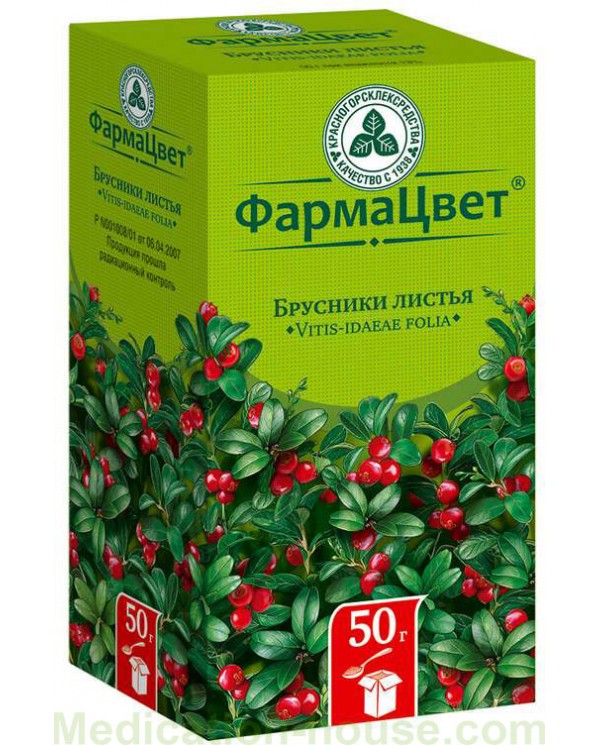Lingonberry leaves instruction for use
Reed more and buy Lingonberry leaves on this page
Lingonberry leaves are a phytopreparation that has a diuretic, antiseptic and anti-inflammatory effect.
Release form and composition
Dosage forms of release of Lingonberry leaves
crushed leaves: pieces of leathery leaves of various shapes that pass through a sieve with holes of 3 mm, odorless, the color of the leaves on one side is dark green, on the other - light green with clearly visible dark brown dots; the taste of water extraction is astringent, bitter (in paper polypropylene or plastic bags of 25, 50, 75 or 100 g, in a cardboard box 1 bag);
shredded vegetable raw materials: pieces of petioles and leaves of various shapes, odorless, color - grayish-green with rare brown, pinkish-purple or violet-brown blotches; taste of water extract - astringent, bitter (in polypropylene or paper bags of 30, 35, 40, 50, 60, 75 or 100 g, in a cardboard box 1 bag);
leaves-powder (raw vegetable-powder): pieces of leaves of various shapes that pass through a sieve with holes of 2 mm, odorless, color - grayish-green with rare brown, pinkish-violet or violet-brown blotches; taste of water extract - astringent, bitter (in 1.5 g filter bags, in a cardboard box 10, 20, 24, 30 or 50 filter bags; in 2 g filter bags, in a cardboard box 10 or 20 filter bags) sachets).
Active ingredient: lingonberry leaves - 100%.
Pharmacodynamics
The drug is characterized by a complex (antimicrobial, demineralizing, astringent, choleretic, diuretic, anti-inflammatory) effect. It is active against Staphylococcus aureus. The medicinal properties of lingonberry leaves are due to the active components contained in them, which include hyperoside, arbutin, tannin, vaccinin, ursular, tartaric, gallic, quinic and ellagic acids, lycopene, hydroquinone, glycosides and various micro- and macroelements.
The drug increases the effectiveness of antibacterial drugs, takes part in the regulation of nitrogen metabolism and stimulates the body's immune system (phagocytosis).
The diuretic effect is explained by the presence of arbutin in the composition of this phyto-remedy, which turns into free hydroquinone, which irritates the renal tissues and enhances the excretion of urine. Increased urine output also provides hyperoside, which undergoes hydrolysis in the body to form quercetin. In the process of metabolism of the glycoside of vaccinine, benzoic acid is synthesized, which has a pronounced antimicrobial effect. It also promotes the disinfection of the urinary tract and relieves the patient's condition with gout, rheumatism, urinary and cholelithiasis.
Indications for use
The medicinal properties of lingonberry leaves are used to treat diseases of the urinary tract and the bladder of inflammatory genesis (cystitis, urethritis).
Contraindications
A contraindication to Lingonberry leaves is an individual intolerance to the biologically active substances of the plant.
Instructions for the use of Lingonberry leaves: method and dosage
Lingonberry leaves are taken orally in the form of an aqueous infusion, preferably 40 minutes after eating.
Cooking method:
chopped leaves, chopped vegetable raw materials: 1 tablespoon (about 6 g) of raw material is poured with 1 glass (200 ml) of hot boiled water (in an enamel bowl) and insisted under a closed lid on a boiling water bath, after 30 minutes, without cooling, filter and squeeze out the remaining raw materials; the volume of the infusion must be brought to the original with boiled water;
powder leaves: pour 2 filter bags with 100 ml (1/2 cup) boiling water (in a glass / enamel bowl) and insist under a covered lid; periodically press the bags with a spoon. After 30 minutes, the sachets are squeezed out. The volume of the infusion must be brought to the original with boiled water.
The recommended dosage regimen: from 3 to 4 times a day, 1-2 tablespoons for a course of 20 to 25 days. The doctor in 10-12 days may prescribe a second dose of the drug. Maximum - 4 courses per year.
It is recommended to shake the broth before taking.
Side effects
Possible violations - hypersensitivity reactions.
Overdose
Overdose cases of this medicinal product have not been registered.
Special instructions
There is no data.
Influence on the ability to drive vehicles and complex mechanisms
According to the instructions, Lingonberry leaves do not affect the performance of potentially hazardous work requiring increased concentration and quick psychomotor reactions (driving, activities related to moving mechanisms, etc.).
Application during pregnancy and lactation
There is no data on the use of lingonberry leaves during pregnancy.
The use of lingonberry leaves during lactation is possible if the intended benefits of treatment for the mother significantly outweigh the possible risks for the child. Taking the drug is possible only after consulting a doctor.
Childhood use
Children under 12 years of age is a contraindication to lingonberry leaves.
Terms and conditions of storage
Store in a dry and dark place. Keep out of the reach of children.
Shelf life is 3 years.
The prepared infusion can be taken within 24 hours, provided it is stored in a cool place.
Reviews of Lingonberry leaves
Mostly, patients leave positive reviews about Lingonberry leaves. According to them, the most effective phytopreparation is in the treatment of cystitis, which is often caused by hypothermia, which makes it possible to do without drug therapy. Some women brew the leaves of the plant during pregnancy, as they help reduce swelling.
Terms of sell
You don't need a prescription from a doctor to buy Lingonberry leaves.

